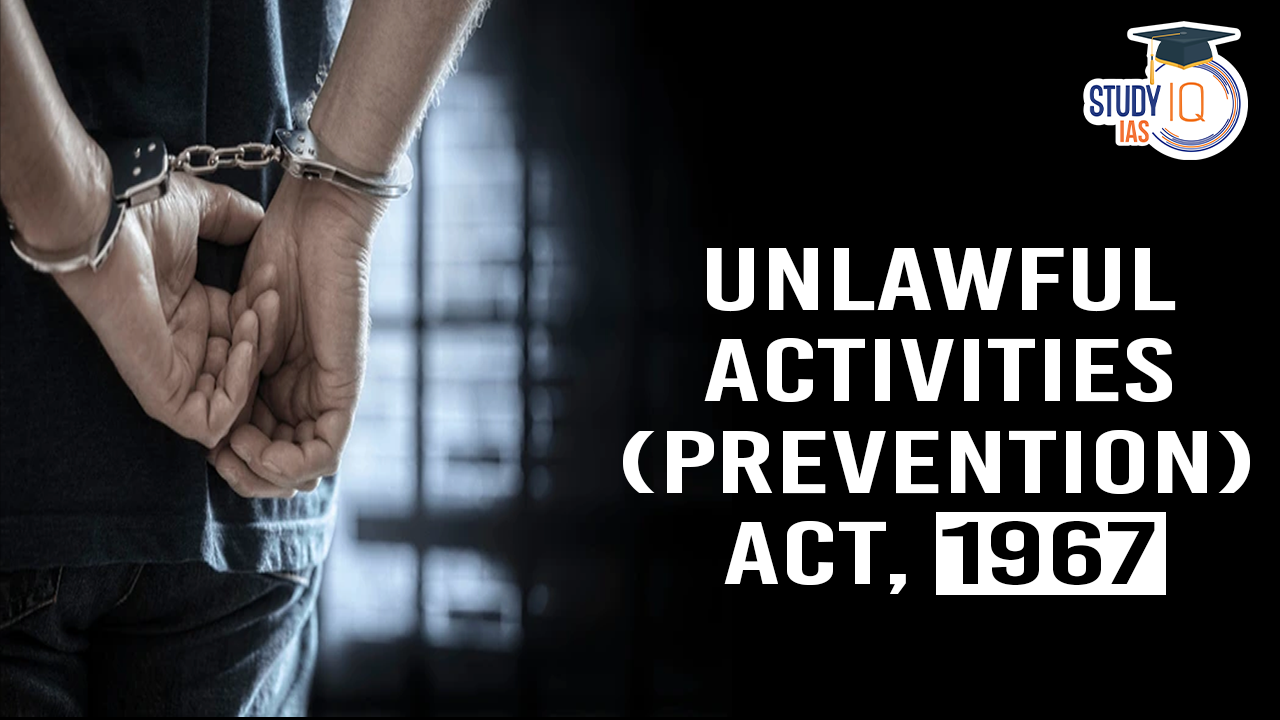Table of Contents
Context: The Delhi Lieutenant-Governor has sanctioned the prosecution of author-activist Arundhati Roy and Kashmiri professor Dr Sheikh Showkat Hussain under the UAPA in connection with a 2010 FIR in which the two are accused of “delivering provocative speeches”.
More in News
- The invocation of the Unlawful Activities (Prevention) Act (UAPA), 14 years after the original FIR, highlights a significant legal manoeuvre.
- This strategy allows the state to bypass the statute of limitations, ensuring the case can proceed despite the lengthy delay.
Invocation of UAPA Charges
Importance of UAPA
- Section 13 of UAPA: Punishes unlawful activities, including advocating, abetting, or inciting unlawful activity, with up to seven years imprisonment.
- Enhanced State Powers: UAPA grants more powers to the state than ordinary criminal law, including:
- Relaxed timelines for filing chargesheets.
- Stringent conditions for bail.
Definition of Unlawful Activity
Similarity to Sedition: UAPA includes acts causing “disaffection against India,” similar to IPC Section 124A, which criminalizes acts that “excite disaffection towards the Government established by law in India.”
Statute of Limitations
- Section 468 of CrPC: Bars courts from taking cognizance of offences after the limitation period.
- Limitation Period: Three years for offences punishable by imprisonment up to three yea
Sedition Charge Stayed
The FIR included IPC Section 124A (sedition), which could have bypassed the limitation but the Supreme Court stayed the provision in May 2022 due to its misuse.
Judicial Precedents in UAPA
Kedar Nath Singh v. State of Bihar (1962)
Supreme Court Guidelines:
- Sedition applies only when speech or actions have the intention or tendency to create public disorder or disturb law and order.
- Freedom of Expression: Citizens have the right to criticize the government as long as it does not incite violence or public disorder.
Unlawful Activities (Prevention) Act (UAPA)
The Unlawful Activities (Prevention) Act, of 1967, is aimed at identifying, prohibiting, and legally addressing individuals, organisations, and activities involved in unlawful or terrorist actions that endanger India’s sovereignty, territorial integrity, and security.
Key Provisions of UAPA
The Unlawful Activities (Prevention) Act, 1967 (UAPA) empowers the Central Government to declare an individual (2019 Amendment) or an organisation as a terrorist/terrorist organisation if they have
- Committed, participated in, prepared for, promoted, or otherwise involved in terrorism.
- To impose all-India bans on associations that are declared “unlawful”.
- Indian nationals and foreign nationals can be charged under the Act, and
- Offenders can be held accountable in the same manner even if the crime was committed on foreign land outside India.
Genesis
- 1963: The Committee on National Integration and Regionalism, appointed by the National Integration Council, makes recommendations.
- The Constitution (Sixteenth Amendment) Act is enacted, empowering Parliament to restrict certain fundamental rights (speech, assembly, association) for national security.
- 1967: The UAPA is passed by Parliament to:
- Implement the restrictions outlined in the 16th Amendment.
- Safeguard India’s sovereignty and integrity.
Applicability
- The law is applicable to both Indian and foreign nationals, and it extends to the whole of India.
- Also includes:
(a) citizens of India outside India;
(b) persons in the service of the Government, wherever they may be; and
(c) persons on ships and aircraft, registered in India, wherever they may be.
| Amendments to the Unlawful Activities (Prevention) Act (UAPA) |
2004 Amendment
2019 Amendment
|
Stats IQ: The Working of UAPA
- Arrests and Conviction: A total of 24,134 people were arrested and faced trial under the UAPA between 2016 and 2020and only 212 of them were convicted.
- Acquittal: 386 people accused under the UAPA were acquitted by different courts.
- State-wise: Of the 1,321 arrests made on UAPA charges in 2020, the maximum was in UP (361), followed by J&K (346) and Manipur (225).
- Age-wise: Around 53% of the total 4,690 people arrested under the UAPA between 2018 and 2020 were aged between 18 and 30, while 13 were below 18 and 10 were above 60 years.
What are the Issues Surrounding UAPA?
- Misuse: Critics argue that the UAPA is often used to suppress political dissent and target activists, journalists, and academics who are critical of the government.
- Lack of transparency: The UAPA allows for prolonged detention without bail, raising concerns about transparency and due process.
- Vague definitions of unlawful activities: The UAPA defines “unlawful activities” broadly, which can be interpreted subjectively, leading to a potential for misuse.
- Federalism: According to Schedule VII, police is a state subject. Giving NIA investigative and asset-attachment powers is seen as encroaching on governmental authority.
- Denied Bail: Under Section 43D (5), a suspect cannot be released on bail if the court determines that there are good grounds to assume that the allegations are accurate at face value.
- Burden of Proof: The burden of proof is on the accused, as opposed to other criminal offences where the burden of proof rests with the State.
- Low Conviction Rate: As per the PUCL (People’s Union for Civil Liberties) report 2022, the problem of bail and conviction rates was at the core of the “abuse” of UAPA.
- This is because of the slow working of the NIA court resulting in the low conviction rate.
- No reporting of Crime incidence in some cases: As per the PUCL report, about 64% of the cases involving Section 18 charges (penalty for conspiracy, etc.) had no incidents that have been documented.
Way Forward
- The freedom of the individual and national security ought to coexist in harmony. To maintain both is essential to India’s democracy.
- The Court must decide whether the scope and effects of UAPA are noticeably disproportionate to its stated objectives.
- A law that successfully combats terrorism while adhering to the requirements of our Constitution is required. A top priority should be the capacity to locate, eliminate, and prosecute terrorists.


 Places in News for UPSC 2025 for Prelims...
Places in News for UPSC 2025 for Prelims...
 Waqf Act (Amendment) 2025: Key Highlight...
Waqf Act (Amendment) 2025: Key Highlight...
 List of Military Exercises of India 2024...
List of Military Exercises of India 2024...





















